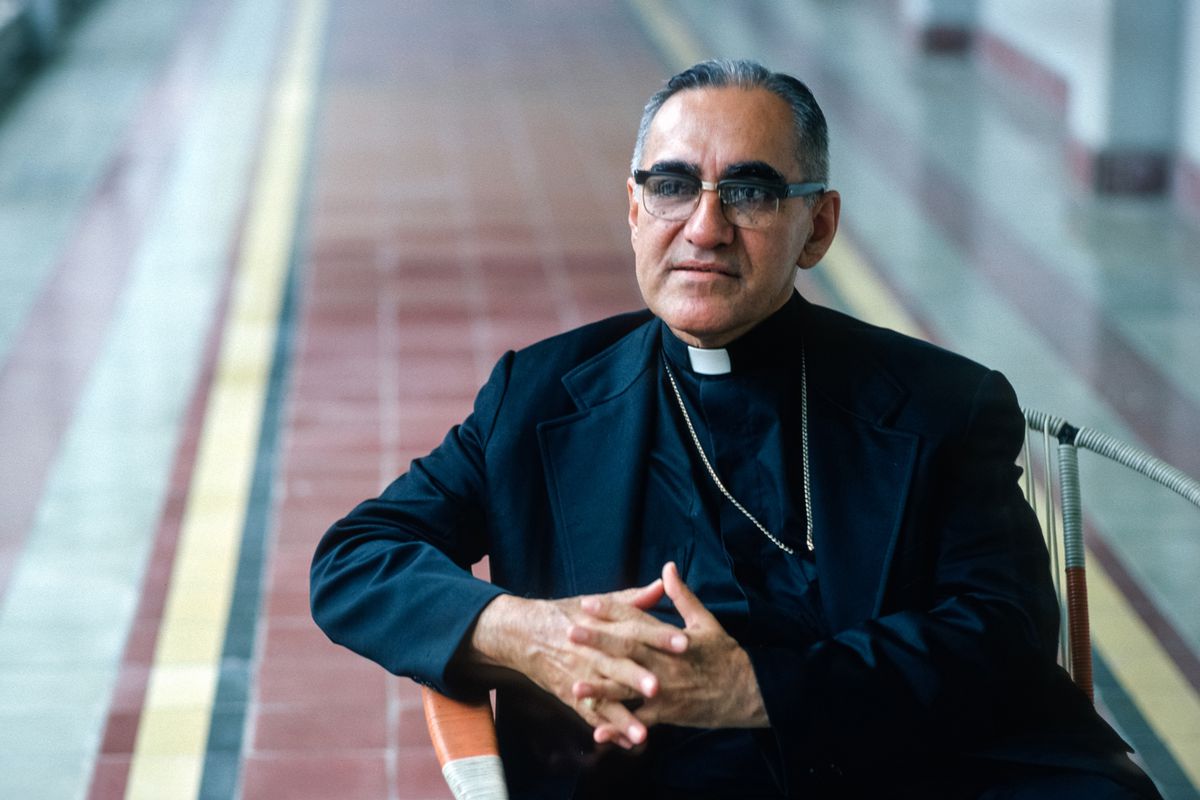
About the Commemoration
Óscar Arnulfo Romero y Galdámez was born in 1917 in Ciudad Barrios, in the mountains of El Salvador near the border with Honduras. He left school at twelve and began an apprenticeship as a carpenter. He showed promise as a craftsman, but while still very young he went to seminary. He trained at San Miguel and San Salvador and completed his theological studies in Rome. He was ordained priest there in 1942, but because of the Second World War no member of his family was present. He returned to El Salvador in 1944 and served as a parish priest in the country before becoming rector of the interdioccsan seminary of San Salvador. In 1946 he became secretary of the Bishops’ Conference of El Salvador and remained in this post for twenty-three years.
He was consecrated bishop in 1970 and served as assistant to the aging Archbishop of San Salvador. In 1974 he was made Bishop of Santiago de Maria and in 1977 Archbishop of San Salvador. There was growing unrest in the country because of social injustices and widespread poverty, and the country was in virtual civil war. He had barely begun his work as archbishop when two of his priests were murdered. Romero demanded an inquiry into the events and set up a permanent commission for the defense of human rights. Accusations and attacks continued, even from within the Church. He continued to condemn all forms of what he called “the mysticism of violence.”
In the evening of March 24, 1980, he was celebrating Mass in the small chapel of the Hospital of Divine Providence, which had been his home since his enthronement as archbishop. As he was about to elevate the bread and wine at the Offertory, Óscar Arnulfo Romero was shot through the heart. Minutes before, he had said in his sermon, “Those who surrender to the service of the poor through love of Christ, will live like the grain of wheat that dies. It only apparently dies. If it were not to die, it would remain a solitary grain. The harvest comes because of the grain that dies….We know that every effort to improve society, above all when society is so full of injustice and sin, is an effort that God blesses, that God wants, that God demands of us.” Aware that his life was in danger, he had already announced, “You may say, if they succeed in killing me, that I pardon and bless those who do it. Would, indeed, they might be convinced not to waste their time. A bishop will die, but God’s Church, which is the people, will never perish.”
Óscar Romero was added to the calendar in the Spanish-language service book produced by the Evangelical Lutheran Church in America, Libro de Liturgica y Cántico (Minneapolis: Augsburg Fortress, 1998); and is on the calendar in Evangelical Lutheran Worship. He is on the 1997 Church of England calendar, the Christian Year, and is among those commemorated in new statues on the west front of Westminster Abbey. He was added to the Episcopal (Anglican) calendar in Lesser Feasts and Fasts 2006.
Excerpts from New Book of Festivals & Commemorations: A Proposed Common Calendar of Saints by Philip H. Pfatteicher, copyright, 2008 by Fortress Press, an imprint of Augsburg Fortress.
See also: Óscar Romero
Reading
A Meditation Attributed to Archbishop Romero, “Prophets of a Future Not Our Own”
It helps, now and then, to step back and take the long view. The kingdom is not only beyond our efforts, it is beyond our vision.
We accomplish in our lifetime only a tiny fraction of the magnificent enterprise that is God’s work. Nothing we do is complete, which is another way of saying that the kingdom always lies beyond us.
No statement says all that could be said. No prayer fully expresses our faith. No confession brings perfection. No pastoral visit brings wholeness. No program accomplishes the Church’s mission. No set of goals and objectives includes everything.
This is what we are about: We plant seeds that one day will grow. We water seeds already planted, knowing that they hold future promise. We lay foundations that will need further development. We provide yeast that produces effects beyond our capabilities.
We cannot do everything, and there is a sense of liberation in realizing that. This enables us to do something, and to do it very well. It may be incomplete, but it is a beginning, a step along the way, an opportunity for God’s grace to enter and do the rest.
We may never see the end results, but that is the difference between the master builder and the worker. We are workers not master builders, ministers not messiahs. We are prophets of a future not our own.
http://www.nextreformation.com/wp-admin/general/romero.htm (accessed October 10, 2007). The meditation was written by Ken Untener (1937-2004), later Bishop of Saginaw, for John Cardinal Dearden in November 1979 for a celebration of departed priests; it has been widely attributed to Archbishop Romero.
Propers
Eternal God of justice and love, you hold in your mind a vision of creation as you intend it to be: By the example of your servant Oscar Arnulfo Romero give us such a view of your work that we may commit the future to you, confident that what we do in your Name will, in your good time, grow and flourish to your glory; through your Son Jesus Christ our Lord, who lives and reigns with you and the Holy Spirit, one God, now and forever.
PHP
Readings: Ezekiel 20:40-42; Psalm 5; Revelation 6:9-11; Mark 8:34-38
Hymn of the Day: “Son of God, eternal Savior” (LBW 364, LSB 842, ELW 655)
Prayers: For compassion for all in need; For social justice; For the poor and the oppressed; For an end to violence.
Preface: A Saint (3) (BCP)
Color: Red
